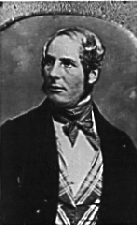William King-Noel, 1st Earl of Lovelace
William King-Noel, 1st Earl of Lovelace, FRS (21 February 1805 – 29 December 1893), styled The Lord King from 1833 to 1838, was an English nobleman and scientist. He was the husband of Lord Byron's daughter Ada, today remembered as a pioneering computer scientist.
The Earl of Lovelace | |
|---|---|
 | |
| Born | Hon. William King 21 February 1805 |
| Died | 29 December 1893 (aged 88) |
| Spouses | |
| Children |
|
| Parents |
|
Early life edit
Lovelace was the eldest son of Peter King, 7th Baron King, and his wife, Lady Hester Fortescue, granddaughter of George Grenville. The politician the Hon. Peter John Locke King was his younger brother.
Educated at Eton and Trinity, he entered the diplomatic service and became secretary to Lord Nugent. He succeeded in the barony in 1833 when his father died.[1] He performed architectural work in his houses.[2]
First marriage edit
In 1835, Lord King (as he then was) married as his first wife the Ada Byron, the only daughter of the poet, Lord Byron, and his wife, Anne Isabella Milbanke. He was created Viscount Ockham and Earl of Lovelace in 1838, and appointed Lord Lieutenant of Surrey in 1840, a post he held until his death.[3] The Lovelace title was chosen to mark the fact that Ada was, through the families of Byron, Milbanke, Noel and Lovelace, a descendant of the extinct Barons Lovelace. The couple had three children: Byron (born 1836), Anne (born 1837), and Ralph (born 1839). Lady Lovelace died in 1852, leaving her husband, in his forties, a widower.
In 1860, the Earl's eldest son, Byron, succeeded his maternal grandmother to become 12th Baron Wentworth according to its special remainder. However, he died, still unmarried, just two years later, and his brother Ralph became 13th Baron Wentworth. In 1861, Ralph assumed by Royal licence the surname of Milbanke in lieu of Noel.
Honorary positions edit
Lord Lovelace was appointed Colonel of the 2nd Royal Surrey Militia on 14 August 1852. He resigned this command on 11 April 1870, when he was appointed Honorary Colonel of the regiment (which became the 3rd Battalion, Queen's (Royal West Surrey Regiment), a position he held until his death.[3][4][5] By Royal licence, in 1860 he assumed the additional surname and arms of Noel, as well as the arms of Wentworth.
Second marriage edit
In 1865 he remarried, to the widow Jane Crawford Jenkins. They had one child, Lionel (1865–1929), who would eventually succeed as 3rd Earl of Lovelace in 1906.
Possessions edit
Lord Lovelace had three homes: Ockham Park, Surrey; Ben Damph Estate on Loch Torridon in Ross-shire; and a house in London.
Horsley Towers edit
Lord Lovelace acquired Horsley Towers (now a hotel) in East Horsley and was patron of the parish church funding the rebuilding of the chancel and the nave in 1869.[6] He also rebuilt the wall of the churchyard which included a number of architectural features such as the gazebo and its family crest-engraved walls. He planned for his death 20 years before he died when began work on a mausoleum in another corner of the churchyard. This mausoleum, has recently been restored.[7]
He had fifteen bridges, known as the Lovelace Bridges, constructed on his estate in East Horsley to facilitate the transport of timber by horse-drawn carts. The bridges were built where the tracks crossed existing bridleways or roads. Ten bridges still exist.
Ben Damph Estate edit
In 1886, the Earl purchased Ben Damph Lodge and its surrounding 12,000 acre sporting estate at the east end of Loch Torridon,[8][9] in Ross-shire, Scotland. In 1889, he became a promoter of the Aultbea Railway.[10]
Death and succession edit
At his death on 29 December 1893, his titles as Earl of Lovelace, Viscount Ockham and Baron King passed to his second (and eldest surviving) son Ralph, who was already the 13th Baron Wentworth. The first Earl of Lovelace was buried in his mausoleum in the churchyard of Martin's Church, East Horsley, which still contains his tomb and that of his second wife.[11]
External links edit
Notes edit
References edit
Citations edit
- ^ "The Barons King & Earls of Lovelace | Lyon & Turnbull". www.lyonandturnbull.com. 2015. Archived from the original on 18 January 2021.
The Lovelace title was chosen to mark the fact that Ada was, through the families of Byron, Milbanke, Noel and Lovelace, a descendant of the Barons Lovelace of Hurley
- ^ "East Horsley, William King – 1st Earl of Lovelace". Exploring Surrey's Past. Archived from the original on 23 October 2020.
Lovelace became famous in his time for the arched trusses in the collar roof of his banqueting hall which had been bent by the application of steam heat. This process was one on which Lord Lovelace became an authority. He delivered a paper to the Institution of Civil Engineers in 1849, two years after his banqueting hall was built, and received praise from no less a person than the great engineer, Isambard Kingdom Brunel.
- ^ a b Burke's: 'Lovelace'.
- ^ Davis, Appendix A.
- ^ 'Army List', various dates.
- ^ St Martin's Church
- ^ Exploring Surrey's Past
- ^ "Local History | Activities at Ben Damph – Torridon – North West Scotland". www.bendamph.com. Archived from the original on 3 November 2016.
- ^ "Torridon & Shieldaig – a history". www.stevecarter.com. Archived from the original on 21 July 2018.
- ^ Drummond, Andrew (2020), A Quite Impossible Proposal: How Not to Build a Railway, Birlinn, pp. 161 & 162
- ^ Exploring Surrey's Past
Books edit
- Burke's Peerage, Baronetage and Knightage, 100th Edn, London, 1953.
- Capt John Davis, Historical Records of the Second Royal Surrey or Eleventh Regiment of Militia, London: Marcus Ward, 1877.